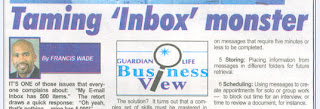Talk of a recession in the U.S. is now fully underway.
In the Caribbean, we have just begun to talk about the fact that when a recession hits the U.S., the after-effects are felt here. As if the increase in oil prices were not enough, we can also expect to see a drop in tourist visits and a decrease in average tourist spending. This affects our bottom-line in Jamaica and other countries in the region that are dependent on the tourist industry as the biggest earner of foreign exchange.
If a recession is to come to the region, then we can expect to see redundancies as companies cut their payrolls to keep their costs in line with a reduction in business.
It’s a good time for employees to start to think about a strategy to make themselves invaluable to their employers. An employee would do well to find ways to do more with less, as the chances are good that their managers are going to be turning to them to ask them to do just that.
If a redundancy is announced, it’s likely that the least productive employees are the ones that are at the greatest risk. In turn, the most productive ones will be assuming the workload of those that are laid off.
While most managers won’t give their employees anything new to deal with the extra load, the smart ones will start now to give them tools, training and alternatives that help them get the job done.
For example, elance, the outsourcing service, offers an excellent value for money, and now would be a good time to get used to using the service. Also, Framework’s NewHabits-NewGoals productivity programme would be an alternative for professionals looking to boost their ability to deal with more each day.
It also might be a good time to buy that extra memory for the laptop, or to set up work-at-home arrangements wherever possible — all in favour of boosting productivity.
The current estimates say that a recession won’t be felt here in the region until 9-12 months from now, so there is still ample time to prepare.

